#include <undo_index.hpp>
Classes | |
| struct | delta |
| struct | node |
| struct | old_node |
| class | removed_nodes_tracker |
| class | session |
| struct | undo_state |
Public Types | |
| using | id_type = std::decay_t<decltype(std::declval<T>().id)> |
| using | value_type = T |
| using | allocator_type = Allocator |
| using | indices_type = std::tuple<set_impl<node, Indices>...> |
| using | index0_set_type = std::tuple_element_t<0, indices_type> |
| using | alloc_traits = typename std::allocator_traits<Allocator>::template rebind_traits<node> |
| using | index0_type = boost::mp11::mp_first<boost::mp11::mp_list<Indices...>> |
| using | id_pointer = id_type* |
| using | pointer = value_type* |
| using | const_iterator = typename index0_set_type::const_iterator |
Public Member Functions | |
| undo_index ()=default | |
| undo_index (const Allocator &a) | |
| ~undo_index () | |
| void | validate () const |
| template<typename Constructor > | |
| const value_type & | emplace (Constructor &&c) |
| template<typename Modifier > | |
| void | modify (const value_type &obj, Modifier &&m) |
| auto | track_removed () |
| void | remove (const value_type &obj) noexcept |
| template<typename CompatibleKey > | |
| const value_type * | find (CompatibleKey &&key) const |
| template<typename CompatibleKey > | |
| const value_type & | get (CompatibleKey &&key) const |
| void | remove_object (int64_t id) |
| int64_t | revision () const |
| session | start_undo_session (bool enabled) |
| void | set_revision (uint64_t revision) |
| std::pair< int64_t, int64_t > | undo_stack_revision_range () const |
| void | commit (int64_t revision) noexcept |
| const undo_index & | indices () const |
| template<typename Tag > | |
| const auto & | get () const |
| template<int N> | |
| const auto & | get () const |
| std::size_t | size () const |
| bool | empty () const |
| template<typename Tag , typename Iter > | |
| auto | project (Iter iter) const |
| template<int N, typename Iter > | |
| auto | project (Iter iter) const |
| bool | has_undo_session () const |
| delta | last_undo_session () const |
| auto | begin () const |
| auto | end () const |
| void | undo_all () |
| void | undo () noexcept |
| void | squash () noexcept |
| void | squash_fast () noexcept |
| void | squash_and_compress () noexcept |
| void | compress_last_undo_session () noexcept |
Static Public Attributes | |
| static constexpr int | erased_flag = 2 |
Detailed Description
class chainbase::undo_index< T, Allocator, Indices >
Definition at line 235 of file undo_index.hpp.
Member Typedef Documentation
◆ alloc_traits
| using chainbase::undo_index< T, Allocator, Indices >::alloc_traits = typename std::allocator_traits<Allocator>::template rebind_traits<node> |
Definition at line 269 of file undo_index.hpp.
◆ allocator_type
| using chainbase::undo_index< T, Allocator, Indices >::allocator_type = Allocator |
Definition at line 239 of file undo_index.hpp.
◆ const_iterator
| using chainbase::undo_index< T, Allocator, Indices >::const_iterator = typename index0_set_type::const_iterator |
Definition at line 285 of file undo_index.hpp.
◆ id_pointer
| using chainbase::undo_index< T, Allocator, Indices >::id_pointer = id_type* |
Definition at line 283 of file undo_index.hpp.
◆ id_type
| using chainbase::undo_index< T, Allocator, Indices >::id_type = std::decay_t<decltype(std::declval<T>().id)> |
Definition at line 237 of file undo_index.hpp.
◆ index0_set_type
| using chainbase::undo_index< T, Allocator, Indices >::index0_set_type = std::tuple_element_t<0, indices_type> |
Definition at line 268 of file undo_index.hpp.
◆ index0_type
| using chainbase::undo_index< T, Allocator, Indices >::index0_type = boost::mp11::mp_first<boost::mp11::mp_list<Indices...>> |
Definition at line 273 of file undo_index.hpp.
◆ indices_type
| using chainbase::undo_index< T, Allocator, Indices >::indices_type = std::tuple<set_impl<node, Indices>...> |
Definition at line 266 of file undo_index.hpp.
◆ pointer
| using chainbase::undo_index< T, Allocator, Indices >::pointer = value_type* |
Definition at line 284 of file undo_index.hpp.
◆ value_type
| using chainbase::undo_index< T, Allocator, Indices >::value_type = T |
Definition at line 238 of file undo_index.hpp.
Constructor & Destructor Documentation
◆ undo_index() [1/2]
|
default |
◆ undo_index() [2/2]
|
inlineexplicit |
Definition at line 244 of file undo_index.hpp.
◆ ~undo_index()
|
inline |
Definition at line 245 of file undo_index.hpp.
Member Function Documentation
◆ begin()
|
inline |
Definition at line 600 of file undo_index.hpp.


◆ commit()
|
inlinenoexcept |
Discards all undo history prior to revision
Definition at line 540 of file undo_index.hpp.

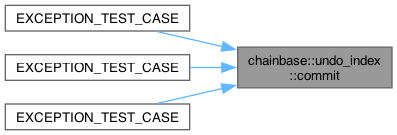
◆ compress_last_undo_session()
|
inlinenoexcept |
Definition at line 676 of file undo_index.hpp.

◆ emplace()
|
inline |
Definition at line 341 of file undo_index.hpp.


◆ empty()
|
inline |
Definition at line 563 of file undo_index.hpp.
◆ end()
|
inline |
Definition at line 601 of file undo_index.hpp.


◆ find()
|
inline |
Definition at line 451 of file undo_index.hpp.
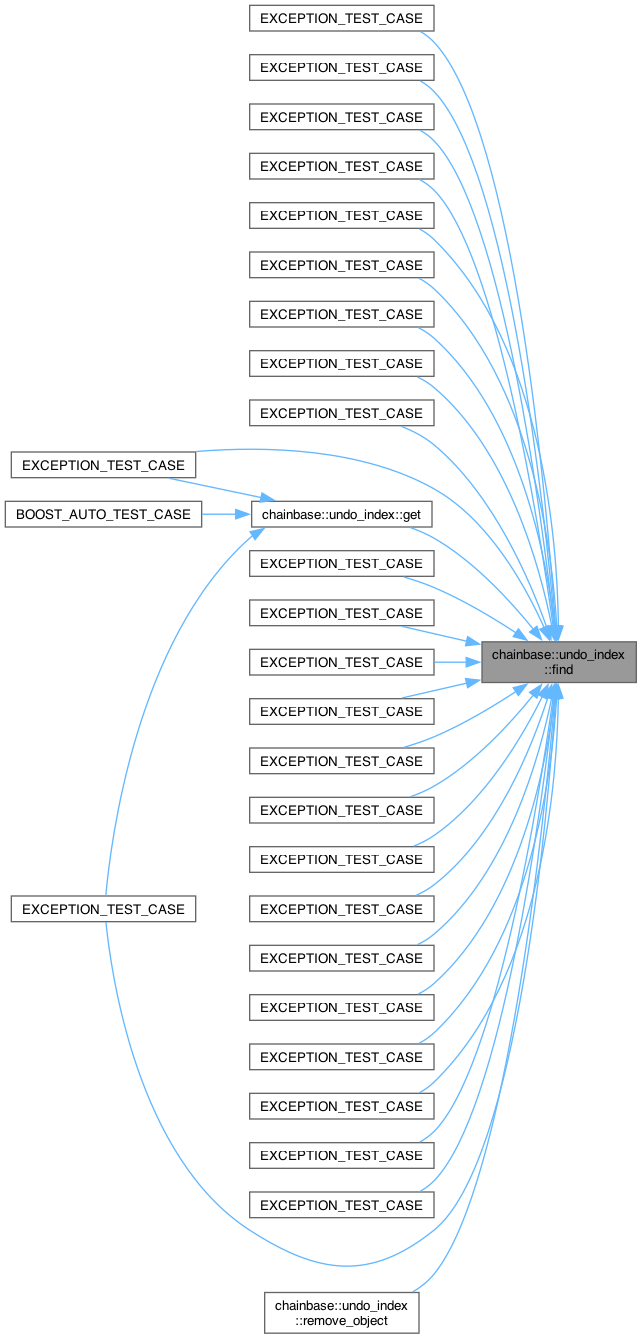
◆ get() [1/3]
|
inline |
Definition at line 554 of file undo_index.hpp.

◆ get() [2/3]
|
inline |
Definition at line 557 of file undo_index.hpp.
◆ get() [3/3]
|
inline |
Definition at line 462 of file undo_index.hpp.


◆ has_undo_session()
|
inline |
Definition at line 579 of file undo_index.hpp.
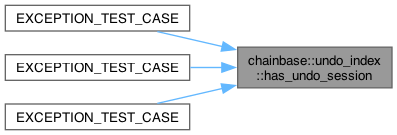
◆ indices()
|
inline |
Definition at line 552 of file undo_index.hpp.
◆ last_undo_session()
|
inline |
Definition at line 587 of file undo_index.hpp.

◆ modify()
|
inline |
Definition at line 365 of file undo_index.hpp.

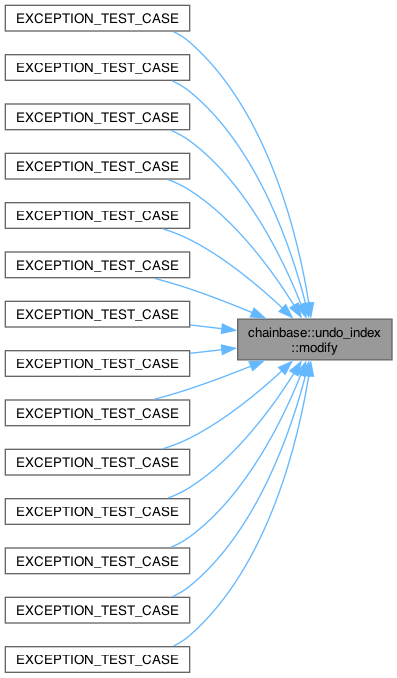
◆ project() [1/2]
|
inline |
Definition at line 568 of file undo_index.hpp.


◆ project() [2/2]
|
inline |
Definition at line 573 of file undo_index.hpp.

◆ remove()
|
inlinenoexcept |
Definition at line 430 of file undo_index.hpp.
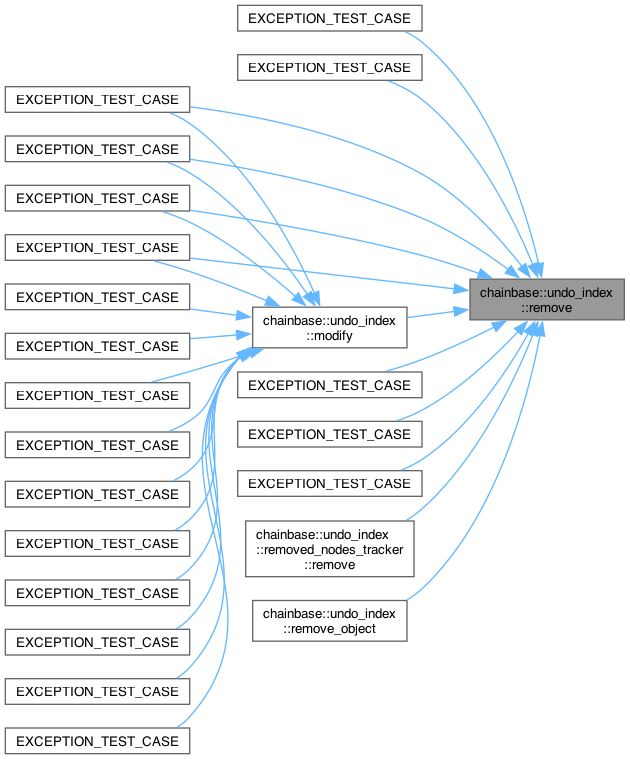
◆ remove_object()
|
inline |
Definition at line 472 of file undo_index.hpp.

◆ revision()
|
inline |
Definition at line 514 of file undo_index.hpp.
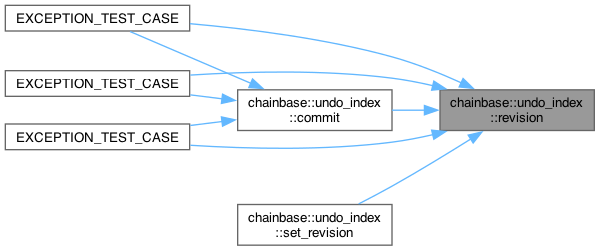
◆ set_revision()
|
inline |
Definition at line 520 of file undo_index.hpp.

◆ size()
|
inline |
Definition at line 559 of file undo_index.hpp.
◆ squash()
|
inlinenoexcept |
Definition at line 655 of file undo_index.hpp.


◆ squash_and_compress()
|
inlinenoexcept |
Definition at line 669 of file undo_index.hpp.


◆ squash_fast()
|
inlinenoexcept |
Definition at line 659 of file undo_index.hpp.

◆ start_undo_session()
|
inline |
Definition at line 516 of file undo_index.hpp.
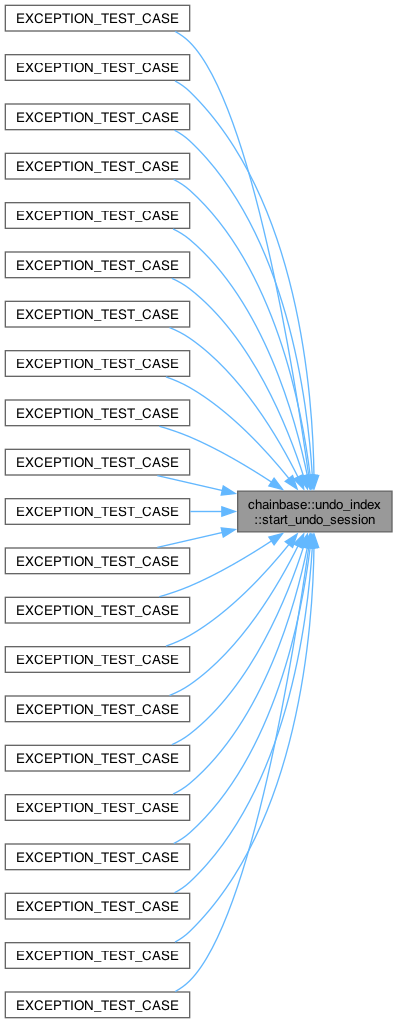
◆ track_removed()
|
inline |
Definition at line 426 of file undo_index.hpp.

◆ undo()
|
inlinenoexcept |
Definition at line 610 of file undo_index.hpp.

◆ undo_all()
|
inline |
Definition at line 603 of file undo_index.hpp.

◆ undo_stack_revision_range()
|
inline |
Definition at line 533 of file undo_index.hpp.
◆ validate()
|
inline |
Definition at line 251 of file undo_index.hpp.
Member Data Documentation
◆ erased_flag
|
staticconstexpr |
Definition at line 264 of file undo_index.hpp.
The documentation for this class was generated from the following file:
- libraries/chainbase/include/chainbase/undo_index.hpp